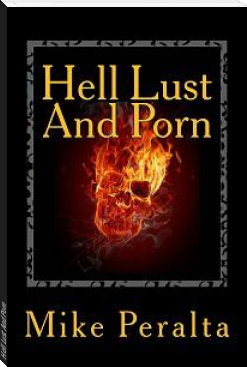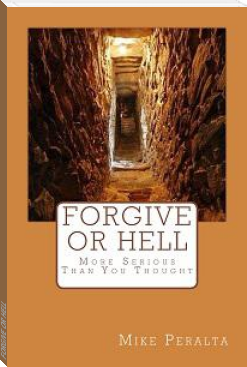TITHE STILL APPLIES - Mike Peralta (e ink epub reader txt) 📗

- Author: Mike Peralta
Book online «TITHE STILL APPLIES - Mike Peralta (e ink epub reader txt) 📗». Author Mike Peralta
The New Testament command to be circumcised of heart (Romans 2:29; Colossians 2:11) is an Old Testament doctrine (Deuteronomy 10:16; 30:6; Jeremiah, 4:4, Leviticus 26:41).
The New Testament command for believers to not marry unbelievers (1 Corinthians 7:39, 2 Corinthians 6:14) is found in Deuteronomy 7:3.
Matthew 22:36-40, "Master, which is the great commandment in the law? Jesus said unto him, Thou shalt love the Lord thy God with all thy heart, and with all thy soul, and with all thy mind. This is the first and great commandment. And the second is like unto it, Thou shalt love thy neighbour as thyself. On these two commandments hang all the law and the prophets." is taken, word for word, from Deuteronomy 6:5, "And thou shalt love the LORD thy God with all thine heart, and with all thy soul, and with all thy might." and Leviticus 19:18, "...thou shalt love thy neighbour as thyself..."
And these are only a few examples where Jesus did not abolish the Law.
CHAPTER 5: WHAT WAS NAILED TO THE CROSS?
It is wise to look at more than one verse to determine what, for example, was nailed to the cross.
There is only one scripture that uses the "nailed it to the cross" expression (NKJV), it is Colossians 2:13-14, in which Paul states,
"And you, being dead in your trespasses and the uncircumcision of your flesh, He has made alive together with Him, having forgiven you all trespasses, having wiped out the handwriting of requirements that was against us, which was contrary to us. And He has taken it out of the way, having nailed it to the cross". (Col 2:13-14)
We will look at what it does and does not say. First though, let's look at what the last chapter of the last book of the Bible teaches:
"Blessed are those who do His commandments, that they may have the right to the tree of life, and may enter through the gates into the city" (Revelation 22:14, NKJV).
Since it is only "those who do His commandments... [who] have the right to enter... the city" (Revelation 22:14 NKJV), the ten commandments could not be "contrary to us". Actually, it is those who will not keep the ten commandments that are denied access. Revelation specifically shows that those who break God’s commandments will be outside God's city (Revelation 22:15).
So then, if the ten commandments were not "nailed to the cross," what was?
Look again at what the Bible actually says (two translations):
“14 having wiped out the handwriting of requirements that was against us, which was contrary to us. And He has taken it out of the way, having nailed it to the cross” (Colossians 2:14, NKJV)
“14 having canceled out the certificate of debt consisting of decrees against us, which was hostile to us; and He has taken it out of the way, having nailed it to the cross.” (Colossians 2:14, NASB)
The handwriting of requirements (often also called the hand-writing of ordinances) or certificate of debt was wiped away and nailed to the cross.
Which requirements were wiped out?
Please understand that the expression "the handwriting of requirements" (cheirógrafon toís dógmasin) is a Greek legal expression that signifies the penalty which a lawbreaker had to pay - it does not signify the laws that are to be obeyed - only the penalty. It is only through the acceptance of the sacrifice of Jesus Christ that the penalty was wiped out ("the handwriting of requirements"). But only the penalty, not the law!
Even some Biblical commentators realize this is so. Notice what Matthew Henry's Commentary on the Whole Bible states about Colossians 2:14:
Whatever was in force against us is taken out of the way. He has obtained for us a legal discharge from the handwriting of ordinances, which was against us (v. 14), which may be understood,
1. Of that obligation to punishment in which consists the guilt of sin. The curse of the law is the handwriting against us, like the handwriting on Belshazzar's wall. Cursed is every one who continues not in every thing. This was a handwriting which was against us, and contrary to us; for it threatened our eternal ruin. This was removed when He redeemed us from the curse of the law, being made a curse for us, Gal 3:13. (from Matthew Henry's Commentary on the Whole Bible: New Modern Edition, Electronic Database. Copyright (c) 1991 by Hendrickson Publishers, Inc.).
In addition, let us look at the Greek term exaleipho translated as "wiped out" in Colossians 2:14:
NT:1813, exaleipho (ex-al-i'-fo); from NT:1537 and NT:218; to smear out, i.e. obliterate (erase tears, figuratively, pardon sin) (Biblesoft's New Exhaustive Strong's Numbers and Concordance with Expanded Greek-Hebrew Dictionary. Copyright (c) 1994, Biblesoft and International Bible Translators, Inc.)
In other words, exaleipho has to do with wiping out sin. This is also confirmed in Acts 3:19 where Peter also uses the term exaleipho, which is translated as "blotted out" below:
19 Repent therefore and be converted, that your sins may be blotted out, so that times of refreshing may come from the presence of the Lord. (Acts 3:19)
Hence, it is sin and the related penalties that are to be blotted or wiped out. And the penalties could vary from "being unclean to the evening" (Leviticus 11:24-28) to making an offering (Leviticus 5:5-6) to being "cut off from his people" (Leviticus 7:27) to the death penalty (Exodus 31:14).
This is also confirmed elsewhere in the New Testament: “Christ has redeemed us from the curse of the law, having become a curse for us” (Galatians 3:13).
The curse of the law is related to the penalty. And Jesus paid it.
But what about the law of God? Was the law of God to be wiped out?
Remember that the Bible clearly teaches that sin is lawlessness: “Whoever commits sin also commits lawlessness, and sin is lawlessness. And you know that He was manifested to take away our sins, and in Him there is no sin.” (I John 3:4-5).
Notice that Paul wrote: “Shall we continue in sin that grace may abound? Certainly not! How shall we who died to sin live any longer in it?” (Romans 6:1-2).
Thus the New Testament makes clear that the law of God continues, thus it was not nailed to the cross or somehow wiped out.
The Bible, however, also shows that the requirements of the Levitical priesthood (Hebrews 9:1,6-10) sometimes called the ceremonial law, which were part of the penalty of sin, were fulfilled by Christ. And why?
"For it is not possible that the blood of bulls and goats could take away sins... By that will we have been sanctified through the offering of the body of Jesus once for all" (Hebrews 10:4,10).
Jesus' one sacrifice was and is sufficient - we do not have to sacrifice animals any more! As clearly spelled out in the New Testament (Colossians 2:16), neither do we need to undergo physical circumcision, follow unclean food laws, nor observe the special festivals as the Old Covenant followers were commanded to do.
However, we are still commanded to obey the moral laws which includes the Ten Commandments, Tithing, and the other moral laws in both the Old and New Testaments. And notice that no-where in the New Testament did Paul, nor any other apostle, tell us to stop obeying the tithe, or the Ten Commandments nor the other moral laws in the Old or New Testament. On the contrary, they strongly exhorted us to obey the moral laws throughout the bible – both Old and New Testament. Any exceptions, usually involving ceremonial laws, are clearly spelled out in the New Testament. And to repeat, no-where in the New Testament are we told that we don’t have to obey the tithe anymore – NO WHERE !
For those who wish to look them up, many of the statutes in the Old Testament are listed in the following chapters: Exodus 20-24; Leviticus 16-27; Numbers 18-19, 27-30, 35-36; and Deuteronomy 12-18.
CHAPTER 6: MALACHI CHAPTER 3 (NIV)
1 “I will send My messenger, who will prepare the way before Me. Then suddenly the Lord you are seeking will come to His temple; the messenger of the covenant, whom you desire, will come,” says the LORD Almighty.
2 But who can endure the day of His coming? Who can stand when He appears? For He will be like a refiner’s fire or a launderer’s soap. 3 He will sit as a refiner and purifier of silver; He will purify the Levites and refine them like gold and silver. Then the LORD will have men who will bring offerings in righteousness, 4 and the offerings of Judah and Jerusalem will be acceptable to the LORD, as in days gone by, as in former years.
5 “So I will come to put you on trial. I will be quick to testify against sorcerers, adulterers and perjurers, against those who defraud laborers of their wages, who oppress the widows and the fatherless, and deprive the foreigners among you of justice, but do not fear me,” says the LORD Almighty.
6 “I the LORD do not change. So you, the descendants of Jacob, are not destroyed. 7 Ever since the time of your ancestors you have turned away from my decrees and have not kept them. Return to Me, and I will return to you,” says the LORD Almighty. “But you ask, ‘How are we to return?’
8 “Will a mere mortal rob God? Yet you rob Me. “But you ask, ‘How are we robbing you?’ “In tithes and offerings.
9 You are under a curse—your whole nation—because you are robbing Me. 10 Bring the whole tithe into the storehouse, that there may be food in My house. Test me in this,” says the LORD





Comments (0)